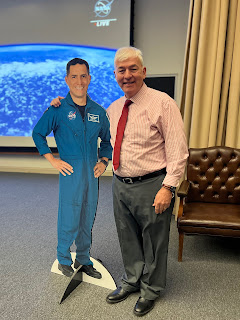Live From Space: USU Alumnus Astronaut Frank Rubio Takes Questions, Talks with Students
By Sarah Marshall
Uniformed Services University (USU) alumnus Army Lt. Col. (Dr.) Frank Rubio, a NASA astronaut, and his colleague Marine Col. Nicole Mann, answered a series of thought-provoking questions from students, staff and military personnel live from the International Space Station (ISS) on Nov. 21.
During the event, which was broadcast live on NASA TV and NASA’s YouTube channel, as well as through USU’s social media sites, the astronauts answered pre-recorded questions from USU students and staff, as well as from local STEM students. The astronauts were asked how they prepare for space, what challenges they might face aboard the ISS, and how they reintegrate upon their return to Earth. They were also asked about how they avoid debris floating in space, how they water plants – including the tomatoes they will soon be growing in space – and what tools they use on a space walk.
The astronauts were also asked how a military physician could assist NASA, either in a support role or as an astronaut. While hovering weightlessly inside the Space Station, Rubio explained that at USU, military physicians are trained to care for those in harm’s way.
“We often think of that as a military or combat environment, but really there’s no more austere environment than space,” he said. Military and civilian physicians alike, he continued, will be needed in space as long as there are humans that need to be cared for in space.
“The reality is that this is the most challenging part of space exploration because of the effects that this environment has on our bodies,” Rubio added.
However, the military is prepared to continue learning and caring for one another, especially as space medicine continues to be an up-and-coming field of study, and as humanity moves towards a space-traveling race, Rubio said.
One USU student asked the astronauts how military officers could make themselves competitive for the astronaut selection program. Rubio explained that he would give the same advice to them as he would give others – from kids to adults – who might want to become an astronaut. There are a lot of different ways to become an astronaut, but he suggests the best way is to find something you love, and become the absolute best at it.
“There are many paths, but when you have a passion and when you devote yourself to being the best you that you can be at that passion, that’s when you’re most likely to shine,” he said.
After fielding questions from space for about 20 minutes, Rubio and Mann, thanked the event’s participants before they floated back to work aboard the Space Station.







